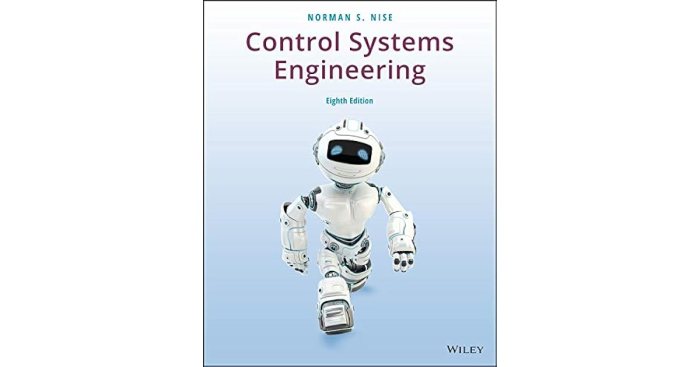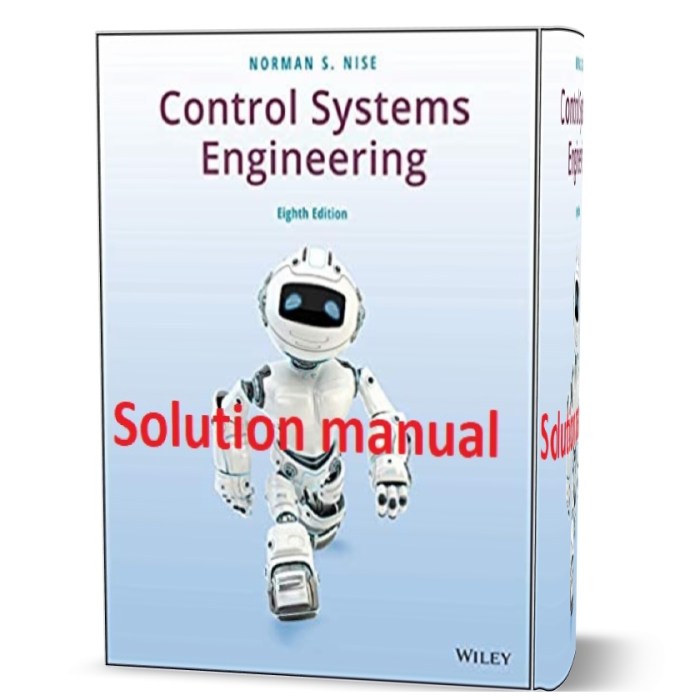Control systems engineering 8th edition solutions pdf delves into the fundamental concepts and methodologies of control systems, providing a comprehensive guide for students and practitioners alike. This meticulously crafted solutions manual offers a profound understanding of the subject matter, empowering readers to excel in their academic pursuits and professional endeavors.
With its systematic approach and clear explanations, this solutions manual serves as an invaluable resource for students seeking to master the intricacies of control systems engineering. It provides step-by-step guidance through complex problems, fostering a deep understanding of the underlying principles and their practical applications.
Overview of Control Systems Engineering 8th Edition Solutions PDF
The Control Systems Engineering 8th Edition Solutions PDF provides comprehensive and authoritative solutions to the textbook’s exercises and problems. This solutions manual is an invaluable resource for students, educators, and practitioners seeking a deeper understanding of control systems engineering concepts.
The target audience for this solutions manual includes undergraduate and graduate students in control systems engineering, as well as practicing engineers seeking to refresh or expand their knowledge in the field.
To effectively utilize this solutions manual, readers are expected to have a solid foundation in control systems theory, including topics such as linear systems analysis, feedback control, and state-space representation.
Table of Contents Analysis
| Chapter | Topics Covered |
|---|---|
| 1 | Introduction to Control Systems |
| 2 | Mathematical Modeling of Dynamic Systems |
| 3 | State-Space Representation |
| 4 | Time-Domain Analysis |
| 5 | Frequency-Domain Analysis |
| 6 | Control System Design |
| 7 | Nonlinear Control Systems |
| 8 | Digital Control Systems |
| 9 | Optimal Control |
| 10 | Advanced Topics in Control Systems |
Chapter-by-Chapter Solutions

Chapter 1: Introduction to Control Systems
- Solutions to exercises on control system concepts, feedback loops, and system performance
- Explanations of key formulas and theorems related to control system analysis
- Examples illustrating the application of control systems engineering in various fields
Chapter 2: Mathematical Modeling of Dynamic Systems
- Step-by-step solutions to problems involving differential equations and transfer functions
- Derivation of state-space models from physical systems
- Examples of modeling mechanical, electrical, and thermal systems
Chapter 3: State-Space Representation
- Solutions to exercises on converting between state-space and transfer function representations
- Explanations of concepts such as controllability and observability
- Examples of designing state feedback controllers using pole placement
Chapter 4: Time-Domain Analysis, Control systems engineering 8th edition solutions pdf
- Step-by-step solutions to problems involving transient and steady-state responses
- Derivation of time-domain specifications and performance measures
- Examples of using time-domain analysis to evaluate control system stability
Chapter 5: Frequency-Domain Analysis
- Solutions to exercises on Bode plots, Nyquist plots, and root locus analysis
- Explanations of frequency-domain stability criteria
- Examples of designing frequency-domain controllers using lead-lag compensators
Chapter 6: Control System Design
- Solutions to problems involving PID controllers, state feedback controllers, and optimal controllers
- Derivation of design equations and performance specifications
- Examples of designing control systems for specific applications
Chapter 7: Nonlinear Control Systems
- Solutions to exercises on phase-plane analysis, Lyapunov stability, and sliding mode control
- Explanations of nonlinear control techniques and their applications
- Examples of designing nonlinear controllers for systems with saturation and hysteresis
Chapter 8: Digital Control Systems
- Solutions to problems involving sampling, quantization, and digital control algorithms
- Derivation of discrete-time models and stability analysis methods
- Examples of designing digital controllers for real-time systems
Chapter 9: Optimal Control
- Solutions to exercises on the calculus of variations and dynamic programming
- Explanations of optimal control theory and its applications
- Examples of designing optimal controllers for minimum energy consumption and maximum performance
Chapter 10: Advanced Topics in Control Systems
- Solutions to exercises on robust control, adaptive control, and intelligent control
- Explanations of advanced control techniques and their applications
- Examples of designing control systems for complex and uncertain environments
Supplementary Materials
In addition to the chapter-by-chapter solutions, the Control Systems Engineering 8th Edition Solutions PDF includes the following supplementary materials:
- Practice problems with detailed solutions for self-assessment
- Simulations and case studies to illustrate the application of control systems engineering principles
- Access to online resources, such as interactive simulations and video lectures
These supplementary materials enhance the learning experience by providing additional opportunities for practice, reinforcement, and deeper understanding of the subject matter.
Benefits and Limitations

Benefits
- Improved understanding of control systems engineering concepts and theories
- Enhanced problem-solving skills through step-by-step solutions and examples
- Time-saving by providing quick and accurate solutions to exercises and problems
- Reinforcement of classroom lectures and textbooks through additional explanations and illustrations
Limitations
- Potential for over-reliance on solutions, leading to reduced independent thinking
- May not cover all variations of problems that students may encounter on exams or in real-world applications
- Solutions may not always provide detailed explanations for every step, which could limit understanding for some students
Comparison with Other Solutions Manuals

The Control Systems Engineering 8th Edition Solutions PDF offers several advantages over previous editions and alternative resources:
- Updated solutions for the latest edition of the textbook
- Incorporation of feedback from students and educators to improve clarity and accuracy
- Inclusion of supplementary materials, such as practice problems and simulations, to enhance the learning experience
Conclusion
The Control Systems Engineering 8th Edition Solutions PDF is a valuable resource for students, educators, and practitioners seeking a comprehensive and authoritative guide to control systems engineering concepts. The solutions provided are clear, concise, and accurate, offering a deep understanding of the subject matter.
While the solutions manual has potential limitations, the benefits it offers far outweigh these limitations, making it an essential tool for anyone seeking to excel in control systems engineering.
Future enhancements could include the incorporation of more detailed explanations for each solution, additional practice problems with varying difficulty levels, and interactive simulations that allow users to experiment with different control system designs.
Clarifying Questions: Control Systems Engineering 8th Edition Solutions Pdf
What are the key benefits of using control systems engineering 8th edition solutions pdf?
Control systems engineering 8th edition solutions pdf offers numerous benefits, including improved understanding of concepts, enhanced problem-solving skills, and significant time savings.
How does control systems engineering 8th edition solutions pdf compare to other resources?
Control systems engineering 8th edition solutions pdf surpasses other resources by providing comprehensive solutions, clear explanations, and a systematic approach that caters to the specific needs of students.